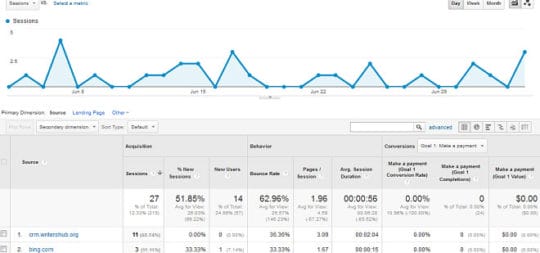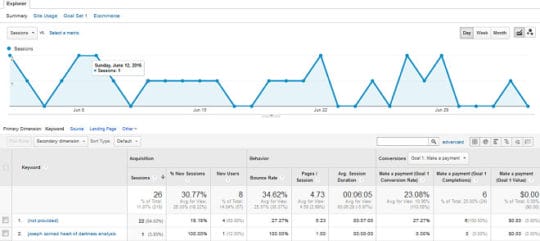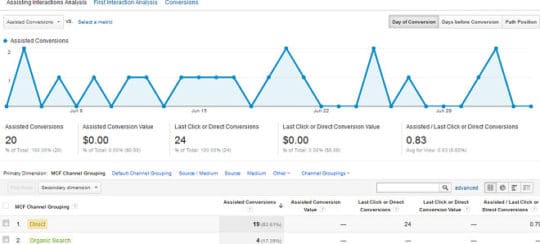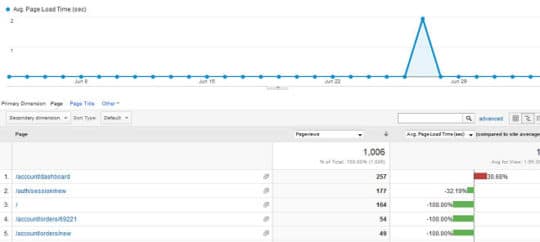It is amazing how many people overlook such a great tool as Google Analytics. It is free to use, easy to understand, and provide some of the most valuable insights so to make someone understand how their business is going online.
And yet, many businesses use it very poorly or don’t use it at all.
But the truth is that if you start to bring it your tasks, Google Analytics can provide you with several insights about how to measure your SEO success. Their reports will allow you to know what is working or not just with a click look.
So here are some tips from experts so you know how to use this powerful tool in your favor.
#1 – Measure your referral traffic
One vital information for your SEO strategy is to know what you are obtaining for outside sources. This so-called referral traffic will tell you, for instance, if the posts that you published on social media are bringing traffic to you. Or you want to know if a digital marketing campaign is performing well.
Go to Acquisition >> All Traffic >> Referrals, and look for the referral traffic report, or go to Social >> Network Referrals and see the metrics to verify how important is social media for your business success.
You will be able to see where your traffic is coming from and decide which strategies are working better for you.
#2 – Check your Organic Search Traffic
If you want to know if your traffic is doing well in terms of organic search traffic, don’t just go to the overall stat that you see on the dashboard.
Go to Acquisition then to All Traffic, Channels and finally Channel Grouping report. Then click on “Organic Search”, so you can see a comprehensive report only regarding your organic search traffic results.
It will help you to know the landing pages and keywords that are performing better, and much more.
#3 – Verify the quality of your traffic
When your goal is more related to the quality of your results, you might think that metrics can’t help you there. But this is not true, as Google Analytics can point you in the right direction.
Go to Conversions, then to Multi-Channel Funnels and there you will find Assisted Conversions. Set your date range to “Last Month” and compare it to your “Previous Period”. It will give you information about who converted on your site or blog coming for search.
This way, you will be able to figure out if the traffic that you are bringing to your website is valuable in terms of conversions, or if you just get many people coming to you but not buying anything.
#4 – Add monetary value to your keywords

Those who feel like everything about SEO sounds abstract, or who need to prove to a board of directors which kind of financial value your SEO efforts is bringing to the company, will be delighted by this tip.
First, make sure that you have access to your Google AdWords profile and that your Google Analytics is synchronized with your Search Console account.
Then go to Acquisition > Search Engine Optimization > Queries.
Your next step will be creating a spreadsheet, where you will list all keywords that are bringing traffic to your website, their respective CTR, and cost-per-click. Then add the result of the multiplication of the cost per click by the quantity of clicks, which will give you a fair idea of the overall organic traffic value per each keyword.
This method will allow you to show how much money the company is saving on Google AdWords thanks to your SEO strategies.
#5 – Identify pages loading slowly
We all know how tiresome and upsetting can be a page that takes ages to load. Most of the time, we just leave it and go to the next Google Search results.
I guess that you have just realized how crucial is to ensure that your pages, especially your landing pages, aren’t that slow.
And if you want to know it, go to Behaviour > Site Speed > Page Timings. Set the middle button to “Average Page Load Time” and the right one to “% Exit”. You can also add a “Secondary Dimension” of Medium and ask the tool to show only organic traffic, for instance.
After doing it, if you identify any problem, it will be time for you to ask your development team to check what is happening and improve the speed of your website or of a specific page.
#6 – Set your own dashboard
Many people don’t know about this feature, but Google Analytics allow you to create your own dashboard interface. And it can make your life much easier by getting your favorite reports in place for you, so you can share and print it without having to go through each page one after the other.
To create your very own dashboard, start by clicking on Dashboards >> +New Dashboards. Then you can go ahead, clicking on “+ Add Widget” choosing the widgets that will provide you with the information that you want. When you get it done, your dashboard will be there for you from now you. Simple like this.
The bottom line

One of the SEO’s biggest challenges in to prove its value in figures. Because it is new in many aspects, it is understandable that we are still learning how to do it. But, as you could see above, we already have several ways to measure our SEO success – and here we only talked about what you can do with Google Analytics.
So either if you are doing it for a client, a board of directors, or just to yourself, make the most of what Google Analytics can provide you in terms of tracking your performance and giving you insights about it. It will become a valuable helping hand in your digital marketing strategy.
This article is written by Kerry Creaswood. She is a young and ambitious writer from Savannah, GA. She is interested in self-development, design, and marketing. Follow her: Facebook | Twitter | Google+ | LinkedIn.








